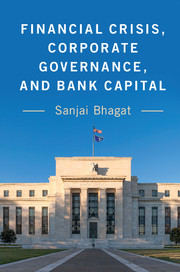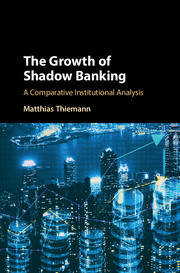Financial Crisis, Corporate Governance, and Bank Capital
- Author: Sanjai Bhagat, University of Colorado Boulder
- Date Published: March 2017
- availability: Available
- format: Hardback
- isbn: 9781107170643
Hardback
Other available formats:
eBook
Looking for an inspection copy?
This title is not currently available for inspection. However, if you are interested in the title for your course we can consider offering an inspection copy. To register your interest please contact [email protected] providing details of the course you are teaching.
-
In the aftermath of the 2007–8 crisis, senior policymakers and the media have blamed excessive risk-taking undertaken by bank executives, in response to their compensation incentives, for the crisis. The inevitable follow-up to this was to introduce stronger financial regulation, in the hope that better and more ethical behaviour can be induced. Despite the honourable intentions of regulation, such as the Dodd–Frank Act of 2010, it is clear that many big banks are still deemed too big to fail. This book argues that by restructuring executive incentive programmes to include only restricted stock and restricted stock options with very long vesting periods, and financing banks with considerably more equity, the potential of future financial crises can be minimized. It will be of great value to corporate executives, corporate board members, institutional investors and economic policymakers, as well as graduate and undergraduate students studying finance, economics and law.
Read more- Presents a solution to the 'too big to fail' problem that will help to avoid future financial crises
- Shows how damaging executive behaviours can be curbed through changing incentives rather than through excessive regulation
- Tackles an issue that is at the heart of US presidential debates and post-Brexit UK politics
Reviews & endorsements
'Bhagat shows that executives in large financial institutions benefited from excessive risk taking while investors and others were harmed. His proposal - protecting society through higher equity requirements and aligning managerial incentives better with long-term value creation - would help address the significant lingering distortions from 'too big to fail' institutions.' Anat R. Admati, Stanford University, California and co-author of The Bankers' New Clothes: What's Wrong with Banking and What to Do about It
See more reviews'Economists have been successful in showing over time that people respond to incentives and disincentives. Professor Bhagat has applied this simple and successful idea to the compensation arrangements for the senior managers of banks, demonstrating with a powerful data-based analysis that it can alter their management strategies and affect the safety and soundness of the banks they manage. It deserves a try; thousands of pages of government regulations over more than 50 years certainly have not worked.' Peter J. Wallison, Arthur F. Burns Fellow in Financial Policy Studies, American Enterprise Institute, Washington, DC
'This book by Sanjai Bhagat is an excellent overview of the impressive body of research on how executive compensation interacts with other variables like bank size and bank capital to affect banking risk and bank fragility. These issues are of critical importance as bank regulators grapple with the task of recalibrating various aspects of regulation to enhance financial system stability. The book is rich in specific research-based executive compensation policy prescriptions for regulators to consider, and should prove to be a valuable resource for those interested in research on executive compensation in banking as well as for regulators.' Anjan Thakor, John E. Simon Professor of Finance and Director of the Wells Fargo Advisors Center for Finance and Accounting Research, Olin School of Business, Washington University in St. Louis
'As always, Professor Bhagat has written a thoughtful and insightful analysis of a difficult and pressing contemporary problem. His proposal for executive and director restricted equity-based compensation at our nation's financial institutions to prevent another crisis is intelligent, intuitive and compelling. I enthusiastically endorse the theory and the book.' Charles M. Elson, Edgar S. Woolard Jr. Chair in Finance and Director of John L. Weinberg Center for Corporate Governance, University of Delaware
'Sanjai's book and ideas underscore a key insight that bank shareholders and management at present have fairly limited ability to internalize the consequences of bank's risks on the economy at large: more equity and long-term incentives are necessary to complement the other regulatory reforms. The book provides a wealth of factual basis that make this insight compelling.' Viral V. Acharya, C. V. Starr Professor of Economics, New York University Stern School of Business
'Professor Bhagat's proposal to require restricted equity compensation for bank executives and to raise their banks' equity capital is backed by sound logic and extensive empirical evidence. This book by a renowned expert in corporate governance and compensation is a must read for anyone concerned with the problem of Too-Big-to-Fail banks.' George Pennacchi, Bailey Memorial Chair of Money, Banking, and Finance, University of Illinois
Customer reviews
Not yet reviewed
Be the first to review
Review was not posted due to profanity
×Product details
- Date Published: March 2017
- format: Hardback
- isbn: 9781107170643
- length: 256 pages
- dimensions: 231 x 157 x 18 mm
- weight: 0.5kg
- contains: 22 b/w illus.
- availability: Available
Table of Contents
1. Introduction
2. Mortgage public policies: 'cause' of the crisis
3. Pre-crisis executive compensation and misaligned incentives
4. Managerial incentives hypothesis versus the unforeseen risk hypothesis
5. Bank CEOs' buys and sells during 2000–8
6. Executive compensation reform
7. Director compensation policy
8. Are large banks riskier?
9. Bank capital structure and executive compensation
10. Why banks should be mostly debt financed: parade of non sequiturs
11. Conclusion.
Sorry, this resource is locked
Please register or sign in to request access. If you are having problems accessing these resources please email [email protected]
Register Sign in» Proceed
You are now leaving the Cambridge University Press website. Your eBook purchase and download will be completed by our partner www.ebooks.com. Please see the permission section of the www.ebooks.com catalogue page for details of the print & copy limits on our eBooks.
Continue ×Are you sure you want to delete your account?
This cannot be undone.
Thank you for your feedback which will help us improve our service.
If you requested a response, we will make sure to get back to you shortly.
×







